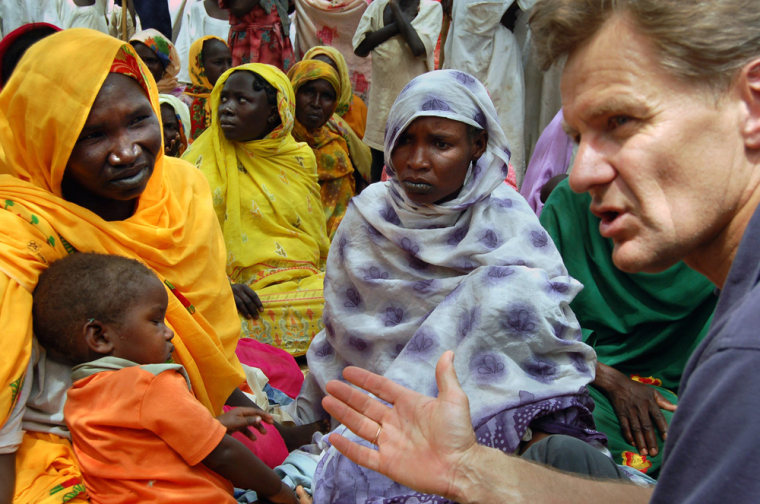Angry demonstrators killed a Sudanese interpreter working with African Union forces in Darfur on Monday in riots that broke out during a senior U.N. official’s visit to a camp for displaced Sudanese.
Jan Egeland, the U.N. undersecretary for humanitarian affairs, said the man was killed in an African Union police station after Egeland and his entourage beat a hasty retreat from the Kalma camp in the face of violent protests.
“It turned out to be a lynching mob who entered the building the wrecked everything and they killed a Sudanese employee of the AU, an interpreter,” he told reporters travelling with him.
Egeland and aid workers had cut short their visit to the camp in South Darfur State after a demonstration by Darfuris demanding the deployment of international troops spun out of control and an aid worker was attacked.
Tensions rising
Tensions have increased among frustrated refugees who learned details of the peace pact signed on Friday in Nigeria between the Sudanese government and the main Darfur rebel group, but rejected by two other rebel factions.
They had hoped a deal would mean an end to three years of fighting that has driven 2 million people from their homes and into squalid camps in Darfur and into Chad.
But many said they were disappointed with the deal, which they feared did not go far enough to protect them.
“This peace is not reality,” said Mohammed Jaama Sineen from Darfur’s largest tribe, the Fur.
“We are asking for international forces. We want to ask Jan Egeland to send the U.N. to protect us,” added the refugee who fled his home when rebels rose against the government in 2003 accusing officials in Khartoum of neglect.
Western governments have called for a U.N. mission to take over from the 7,000 African Union peacekeepers in Darfur. Sudan has said in the past it would only consider a U.N. mission in its vast west after a peace agreement.
European Union and African Union foreign ministers, meeting in Vienna, said the peace deal should pave the way for an early agreement between the United Nations and Sudan on the U.N. role in Darfur.
Bush praises Sudan agreement
Earlier Monday, ion Washington, President Bush called for more U.N. peacekeepers for the Darfur region of Sudan on Monday and pledged an increase in U.S. food aid. He also welcomed a proposed peace accord as “the beginnings of hope” for Darfur’s poverty-stricken population.
“Darfur has a chance to begin anew,” Bush said.
Bush announced he had directed five U.S. ships to be loaded with emergency food for Sudan, and also said Secretary of State Condoleezza Rice would ask the U.N. Security Council on Tuesday for a resolution speeding up deployment of U.N. peacekeepers to Darfur.
He also said he was asking Congress for another $225 million in emergency food aid for Darfur, was ordering the emergency purchase of 40,000 metric tons of food and was dispatching five ships loaded with food to the region.
“America will not turn away from this tragedy,” Bush said, standing alongside Deputy Secretary of State Robert Zoellick, just returned from Darfur.
A call for global involvement
Bush invited other countries to also do more to help relief efforts in Darfur.
The president sought to build momentum for a peace agreement reached by Sudanese authorities and Darfur’s main rebel group. The deal could help end a conflict that has killed at least 180,000 people in three years and displaced some 2 million.
“We’re still far away from our ultimate goal, which is the return of millions of displaced people to their homes so they can have a life without fear,” Bush added. “But we can now see a way forward.”
On Saturday, the president called Olusegun Obasanjo, the Nigerian president who hosted talks on Darfur, and Denis Sassou-Nguesso, the president of the Republic of Congo and current head of the 53-nation African Union.
U.N. Secretary-General Kofi Annan wants Sudan to grant visas to a U.N. assessment team so it can visit Darfur and start planning for a U.N. peacekeeping force to take over from the African Union troops. Sudan has refused to allow the team to visit.
The peace deal signed Friday was between the government and the main rebel group, the Sudan Liberation Army; two smaller rebel groups refused to sign.
